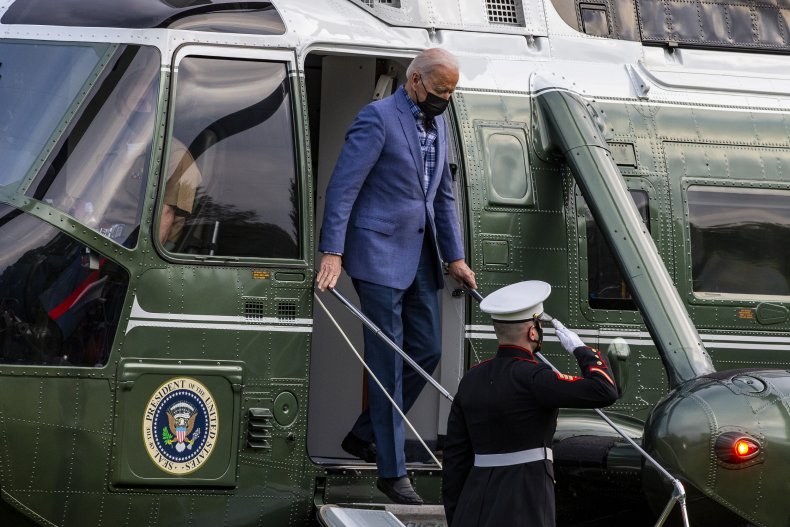It's Up to Us, Not Government, to Make Our Energy Choices | Opinion
Another Earth Day ambled by last week, and with it the usual calls for wildly unreasonable energy goals that would require a frontal assault on the economy and on consumer choice. But for the first time in a few years, this ill-advised climate panic came from the White House.
At Thursday's virtual "summit on climate," President Joe Biden told the world: "The signs are unmistakable. The science is undeniable...the cost of inaction keeps mounting." Three myths in a single paragraph is quite the feat, even for a modern politician.
The "signs" of climate change are in the eyes of beholders. A vigorous community of researchers who dispute that "undeniable" science is climbing uphill against politics, funding and groupthink to observe that Earth has seen chapters of cooling before we pivoted toward cleaner energy, and occasions of warming since.
As for the currently invisible "cost of inaction," even an imaginary price tag would struggle to reach the expected cost of actual actions proposed by the Green New Dealers. The oppressive assault of new taxes, regulations and mandates that would be required to wrestle the nation away from its preferred energy landscape would cripple businesses and individual households.
I am writing from Texas, which has no shortage of renewable energy technologies. Our wind turbines did not exactly shine when temperatures dropped to near zero across the state in February, but they remain part of a vigorous green marketplace that also features a growing solar market. But make no mistake: fossil fuels run our state as much as any other. Across the nation, coal, oil and natural gas are all used far more cleanly than in past decades, allowing our air to grow cleaner without draconian overreach from climate activists.
Electric cars and solar-paneled roofs grow more common every year. These are the choices made by consumers seeking green technologies. It's not hard to find industry cheerleaders predicting that we will simply grow weary of gasoline-powered cars and oil-heated homes. If that happens, fine. But it is a path that should be blazed by freedom of choice. If one of my neighbors buys a Tesla, that is his business. If another neighbor prefers a Ford F-350 with a thirsty V-8, that is his business. It is none of mine, and none of Washington's.
But climate tyranny erodes far more than choice in the energy marketplace. It will take a toll in jobs as well, and not just in my energy-rich state.

"When people talk about climate, I think jobs," Biden said. I do, too. I think of jobs vanishing into a fantasy world where oil and gas workers, stripped of their high-paying livelihoods, are shunted into factories to cobble solar panels. New technologies can indeed be expected to yield some number of new jobs, but there is no reason to imagine they will be of a sufficient type and number to rescue the millions who are working today to meet our current energy demands.
But fear not—Biden and his climate warriors envision new jobs that can be filled by traditional energy-sector workers: the dismantling of the workplaces that have reliably fed and clothed their families. "I see workers capping hundreds of thousands of abandoned oil and gas wells," Biden proclaimed wistfully, "and abandoned coal mines that need to be reclaimed."
Why will those wells and mines be abandoned? It won't be the result of Americans vaulting toward so much green tech that the coal and oil industries die a natural death. Those sources will have been killed by an alarmist agenda in Washington. The trigger will be pulled by people who have told us for 50 years that our coastal cities would be underwater or our polar ice caps melted five times over by now.
Why aren't the high priests of green energy content to simply promote solar panels and electric cars, and watch in satisfaction as consumers enthusiastically opt for what they are selling? Because the engine of this push is powered by the oldest fuel in government: a hunger for political power.
Climate extremism seeks to wrestle choices from our lives and money from our pockets, establishing a government takeover of much of the economy. Just as the definition of "infrastructure" has been telescoped out into whatever its sales force wishes it to mean, Green New Deal proponents easily slide into other gigantic programs—federal jobs guarantees, more government child care and taxpayer-financed political campaigns, for starters.
If Joe Biden is president for the remaining three Earth Days of his term, he will have a lot of opportunities to twist millions of arms, joined by an approving chorus of news media and a corporate culture that seems to care only about blue states. But if Congress and the White House change hands in upcoming elections, different policies can preserve our jobs and our energy future.
A conservative energy policy does not reject solar, wind or any other shiny new technology that may arise. But it will leave to Americans, and not politicians, the power to make the choices that determine which sectors rise and which fall.
Mark Davis is a talk show host for the Salem Media Group on 660AM The Answer in Dallas-Ft. Worth, and a columnist for the Dallas Morning News and Townhall.
The views expressed in this article are the writer's own.


